An epicurean adventure to: France
Say bonjour to perfectly crispy mini roast potatoes with soft, fluffy centres, all thanks to this easy Parmentier Potatoes (Pommes Parmentier) recipe from wonderful France.
By roasting bite-sized potato cubes instead of larger spuds, you achieve superior crispness per bite in less roasting time. As the potatoes roast, the exterior moisture evaporates from the small cubes, leaving lots of crunchy edges contrasting the soft, steamy interiors.
No need to preheat the oil to the smoking point in the oven first - it's always a risky business balancing a tray of steaming hot oil! Simply toss the mini potatoes in cold oil first. We'll add the herbs and garlic towards the end of the cooking process for an incredible herbaceous aroma.
You can customise this recipe by swapping the herbs or adding different spices. It's a delicious side dish alongside Sunday roasts, but also quick enough for weekday sides, thanks to how quick and simple it is to make.

Jump to:
- Why are they called Parmentier Potatoes?
- Fast facts - France
- What's to love about this recipe
- Key ingredient notes and substitutions
- How to cube potatoes for Parmentier potatoes
- How to make Parmentier potatoes: Step-by-step
- Top tips
- Variations
- Serving suggestions
- Storage
- Can you freeze Parmentier potatoes?
- Recipes to pair with Parmentier Potatoes
- FAQ
- More Christmas recipes
- More potato recipes
- Recipe
Why are they called Parmentier Potatoes?
They are so named in honour of the French pharmacist Antoine-Augustin Parmentier who championed potatoes in Europe after they were brought from South America in the 1500s.
Despite resistance to the odd tubers by the French people, Parmentier recognised their nutritional potential during the 18th century's famines. To sway the sceptics, he staged elaborate potato feasts and planted guarded potato fields outside of Paris.
Locals stole the "mysterious" valuable crops at night, thus introducing the humble potato into French diets and kickstarting its acceptance into the much revered French cuisine. Parmentier's clever tactics overcame doubts, transforming potatoes from alien to essential!
Fast facts - France

| Location | France is located in Western Europe and is bordered by several countries, including Belgium, Luxembourg, Germany, Switzerland, Italy, Spain and Andorra. It also has coastlines along the Mediterranean Sea, the Atlantic Ocean and the English Channel. |
| Capital | Paris. |
| Language | The official language of France is French. |
| Population | Circa 67 million people. |
| Trivia | The French superstition that turning a baguette upside down brings bad luck likely originated in medieval times. Legend says on execution days, the town baker would reserve the executioner's bread by flipping it upside down. This associated inverted baguettes with death, creating an enduring superstition. |
What's to love about this recipe
- Faster and easier than regular roast potatoes, ready in just 45 minutes.
- Better ratio of crispiness to fluffy interior due to the small potato cubes.
- No need to preheat oil, skipping a messy extra step.
- Perfect side dish for a Sunday roast or to accompany any meal that compliments potatoes.
- A very crowd-pleasing potato dish. Leftovers unlikely!
- Easily customised with your favourite herbs and spices.
- Minimal prep work leaves you time to focus on other dishes.
Key ingredient notes and substitutions
**Please see the recipe card at the bottom of this post for the full list of ingredients.

Potatoes
For the perfect roast potatoes, choose a starchy, floury potato variety. Anything that says on the bag that it's good for roasting or chips.
In the UK, Maris Piper, King Edward and Rooster potatoes are top choices as they get wonderfully fluffy and absorb seasoning well.
For Americans, Yukon Gold makes an excellent roast potato with its creamy texture.
For the Aussies, Sebago potatoes and Desiree potatoes.
Waxy potatoes like new potatoes or red potatoes are better for boiling or salads.
If you're worried about how to cut potatoes for the perfect Parmentier cubes, we have a guide further down.
Vegetable oil
Apart from vegetable oil, any neutral oil with a high smoking point will work, like sunflower oil, canola oil, avocado oil and corn oil.
Avoid oils with a low smoking point. These oils can break down and release unpleasant flavours and potentially harmful compounds when exposed to high heat. Oils to avoid for roasting include extra virgin olive oil, walnut oil, flaxseed oil, coconut oil and butter.
Herbs
In this recipe, we've gone with fresh rosemary, but feel free to customise it with your preferred fresh herbs. Consider adding parsley, thyme, oregano or basil for alternative flavour dimensions.
If fresh herbs aren't on hand, dried herbs can step in as a suitable alternative. While not quite as superior in taste as fresh, they still bring robust flavours to the dish. Dried Italian seasoning, in particular, goes really well with these tatties.
Garlic
When it comes to roast potatoes, garlic is the perfect partner! We typically work with three to four fresh garlic cloves, adjusting depending on their size. Aim for around one heaped tablespoon of chopped garlic, but feel free to fine-tune according to your preference.
For added convenience, garlic powder, garlic granules or onion powder can step in as substitutes.
Salt and pepper
Properly seasoning the potatoes is key. While the amount can vary based on your preference, we lean towards a robust flavour, using around one teaspoon of salt in this recipe for that satisfying salty kick.
As for the pepper, we incorporate half a teaspoon of freshly ground black pepper. Of course, feel free to tailor these amounts to match your personal taste buds.
How to cube potatoes for Parmentier potatoes
Let's break down a couple of important points:
First off, the potato we've showcased in the demonstration below happens to be of medium-large size. However, if you're working with a mix of smaller potatoes, the technique may need a slight tweak but the fundamental idea remains the same. The goal is to achieve cubes that are roughly 2cm x 2cm (that's just under an inch wide).
Secondly, there's no need to obsess over slicing perfect cubes. Seriously, once these delicious roasties hit the table, nobody's going to conduct a geometry inspection. Those rounded and pointy bits that often get discarded by uppity chefs are actually the best bits!
Take a close look at our featured photo at the top of the page. You might notice that a few cubes resemble triangles. Those are the end parts of the potatoes. Does it cause any concern? Chances are, unless you're meticulously detail-oriented, you likely didn't notice until we brought it up.

- For a medium-large potato, slice it into thirds, aiming for each third to be about 2cm wide when viewed from the top. If your potato is smaller, just halving it will do. A very large potato may need four slices.

- Turn the thirds onto their sides.

- Take each third and slice it in half, maintaining that 2cm width.
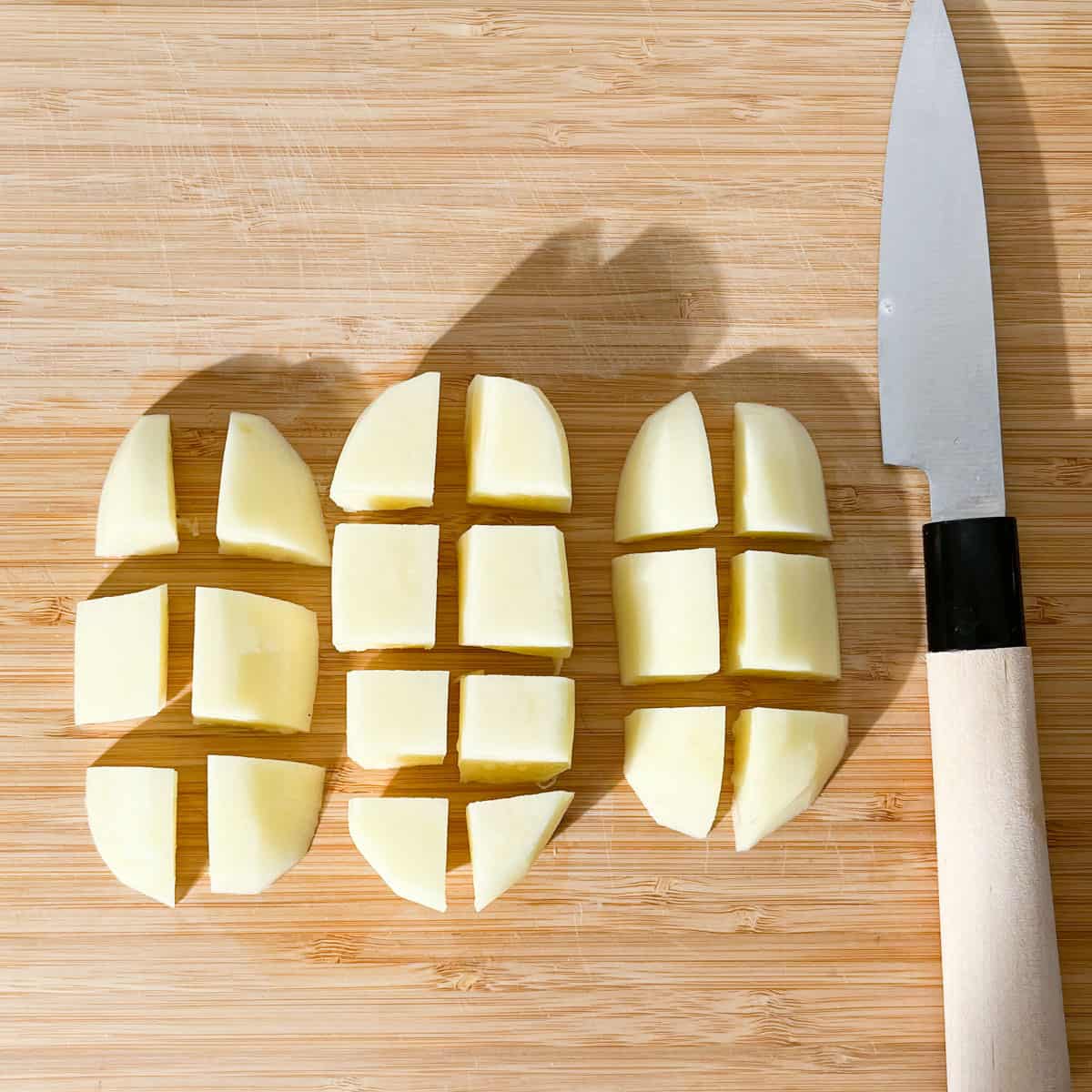
- Now, slice the halves into smaller pieces, creating cubes roughly 2cm in size. Note that the middle slice of the potato might yield longer pieces, allowing you to eke out a couple of extra cubes. And there you have it, cubes at the ready!
How to make Parmentier potatoes: Step-by-step
- Preheat the oven to 220°C/428°F/gas mark 7. Have a large baking sheet ready.

- Strip the leaves from the rosemary sprigs and finely chop the rosemary. Peel and chop the garlic.
- Peel and then slice the potatoes into cubes of roughly 2cm x 2xm.

- Place the cubes of potatoes in a large saucepan and cover them with cold tap water.
- Place the saucepan on the stove over medium-high heat.
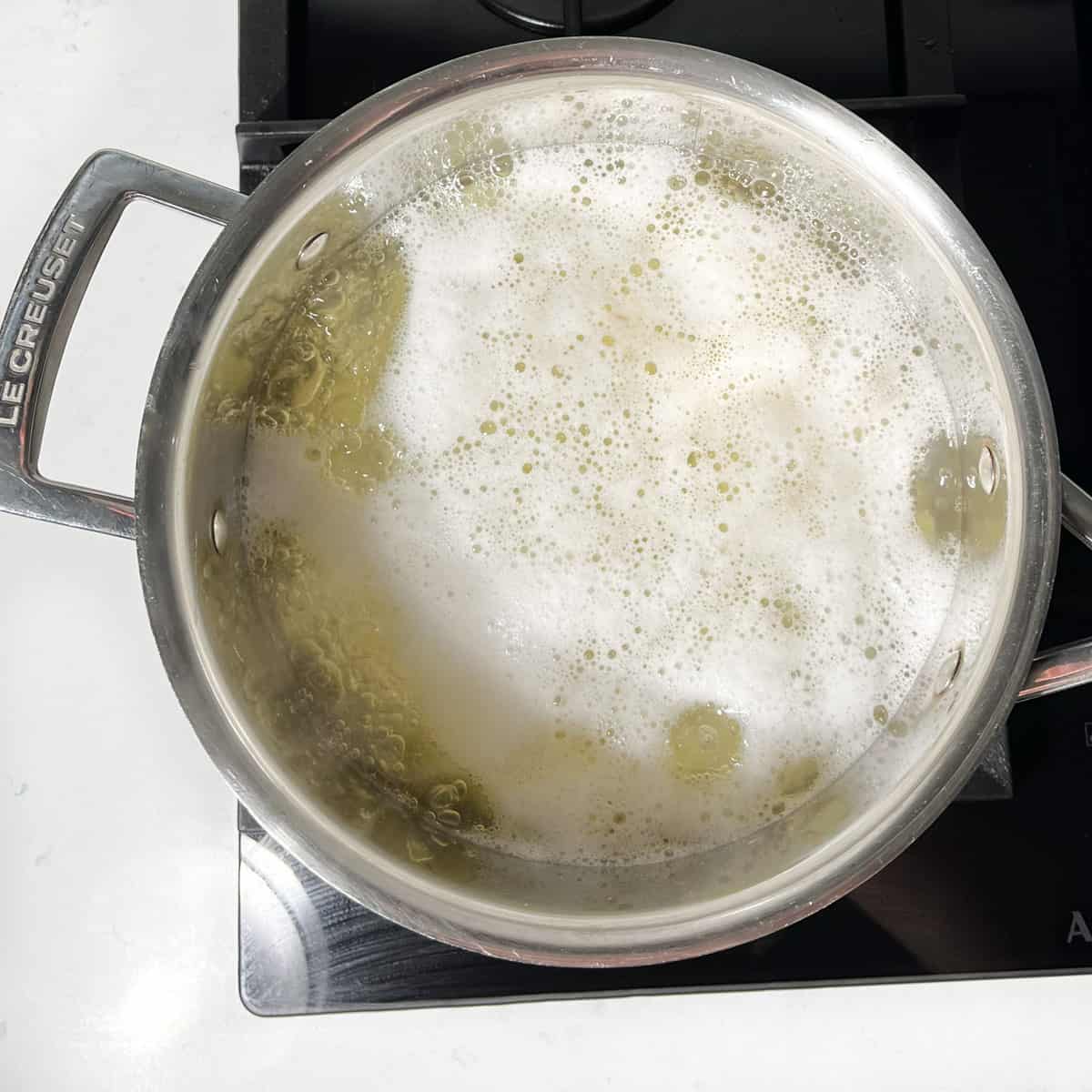
- Once the potatoes reach a rolling boil, immediately remove them from the heat. Do not boil them longer.
A rolling boil has large bubbles continuously rising rapidly to the surface. It is more vigorous than a gentle simmer.

- Drain the potatoes thoroughly in a colander. Then return them to the saucepan and leave to steam-dry for about 5 minutes (don't shake them as you might do for traditional roast potatoes).
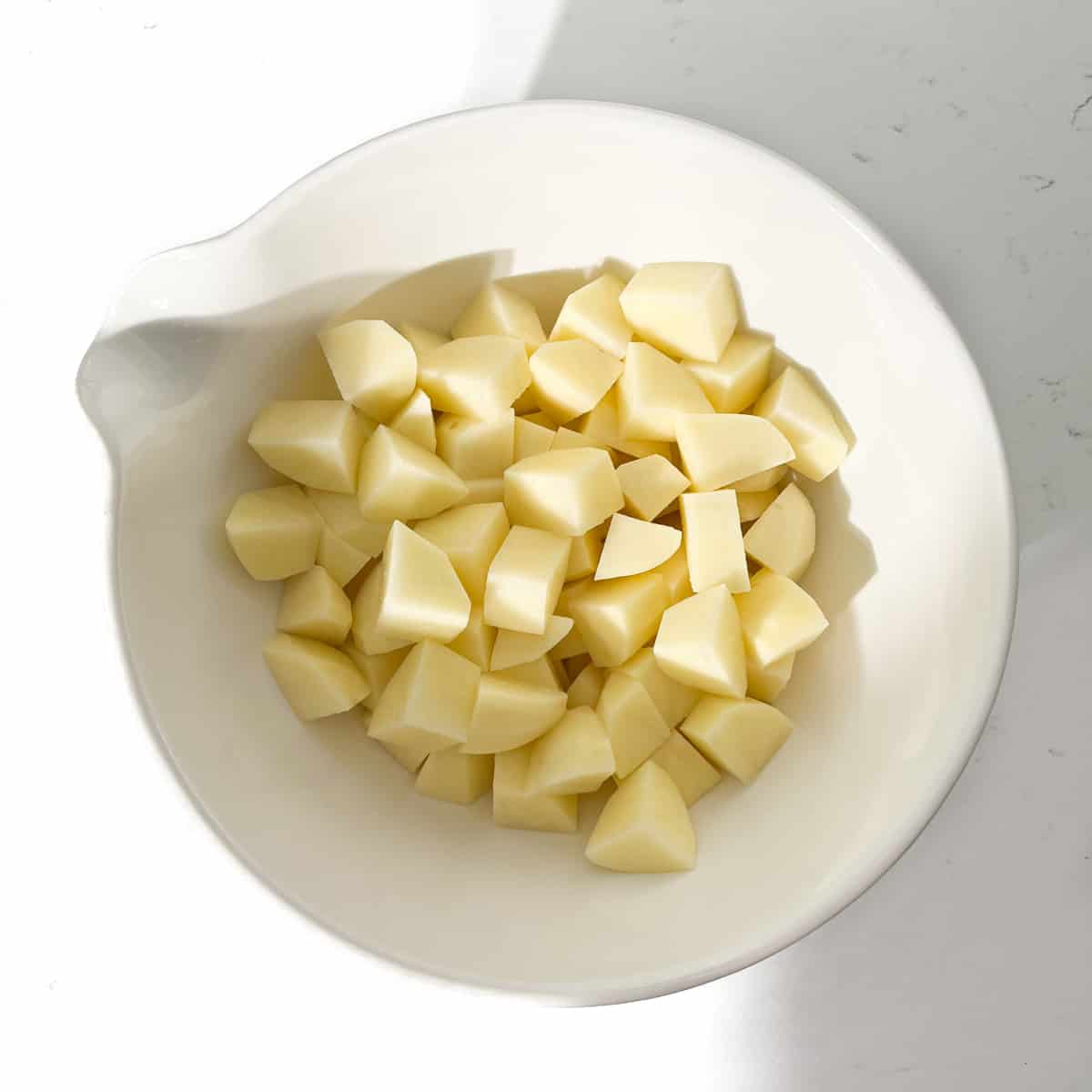
- Once the potatoes are dry, transfer them to a large bowl.
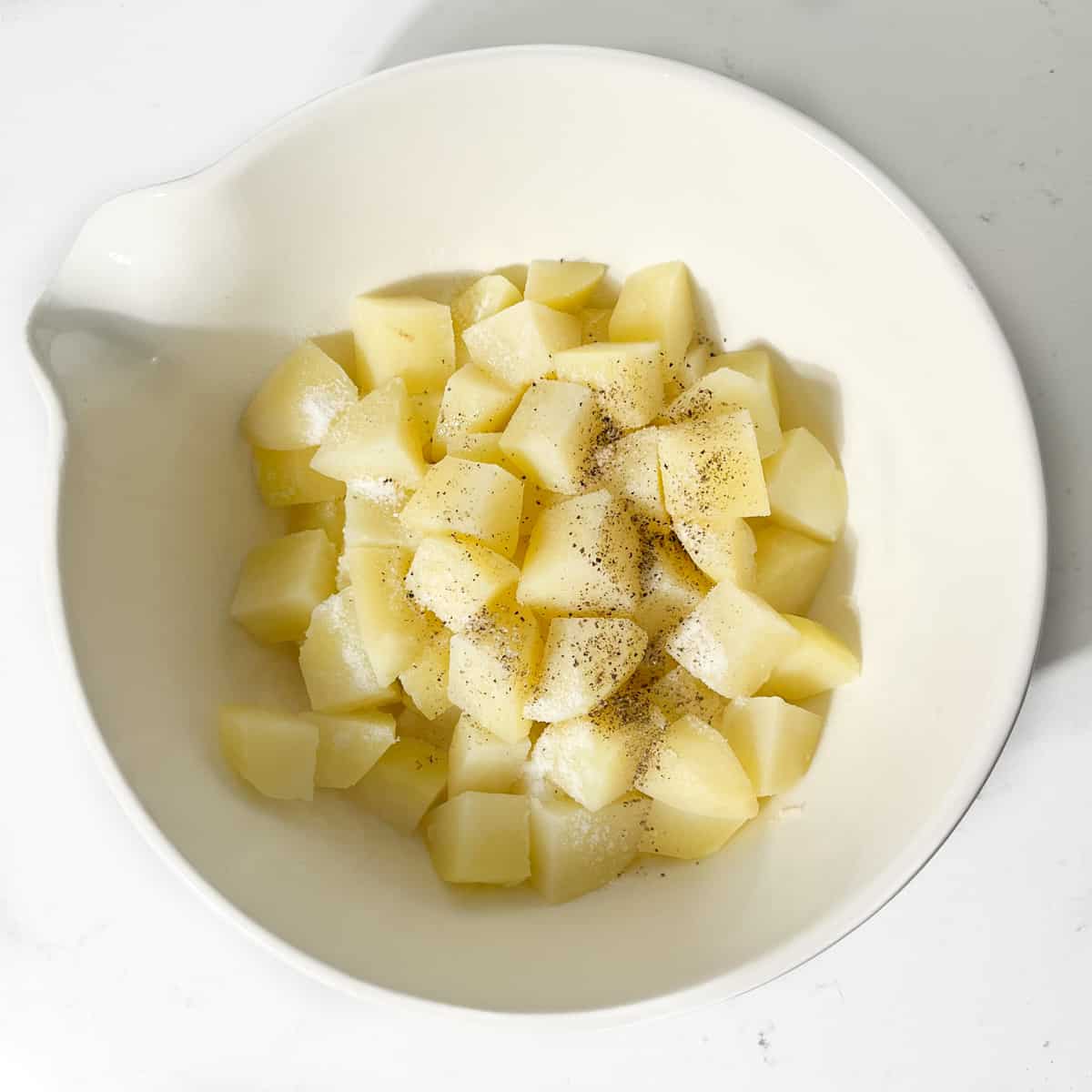
- Add the olive oil, salt and black pepper to the potatoes.

- Gently mix the oil and seasoning into the potatoes using a large spoon. Take care to coat each cube thoroughly on all sides.
Use a gentle up-and-over motion to spoon oil from the bottom of the bowl back onto the potatoes.
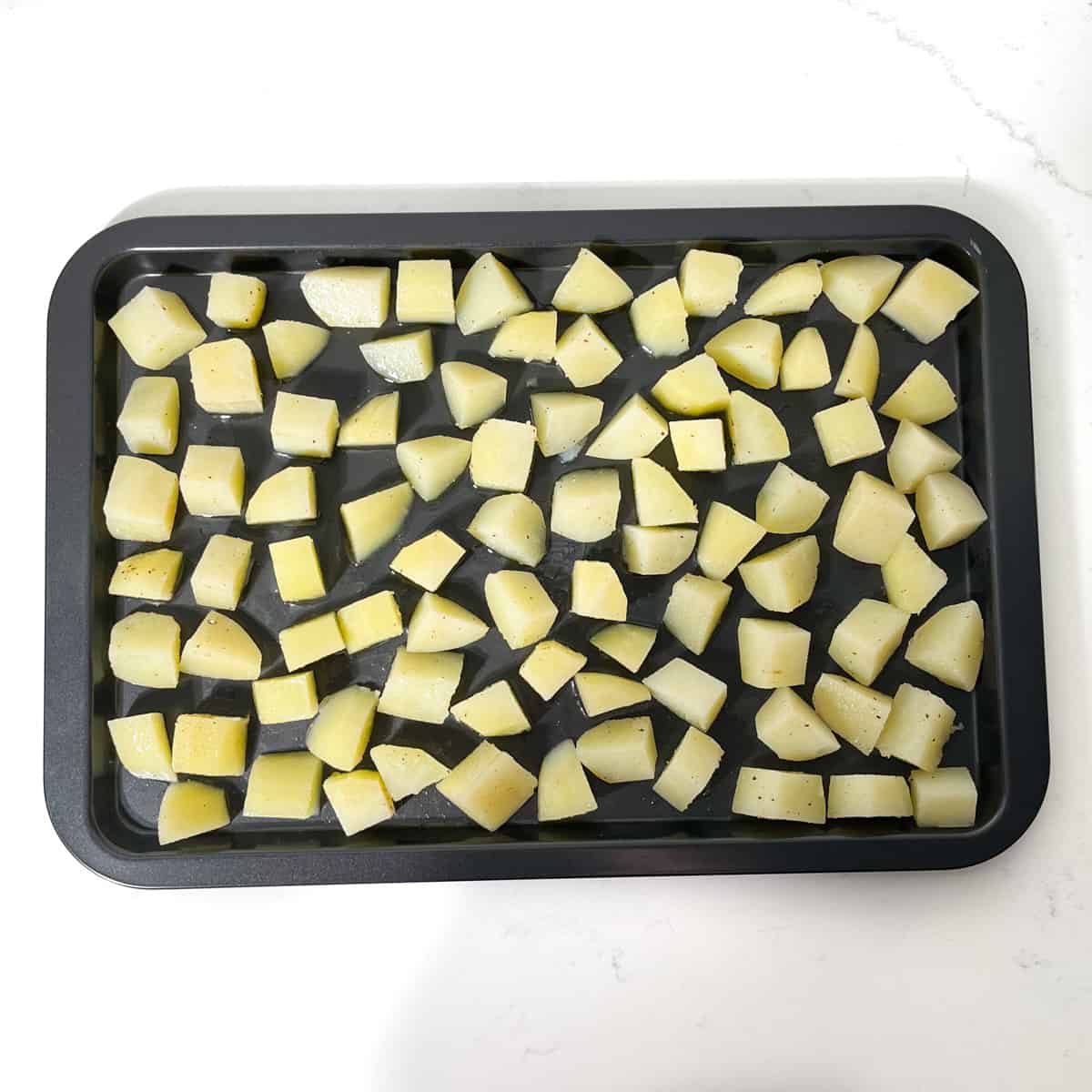
- Tip the well-oiled potato cubes onto the baking tray in a single layer without touching. This allows for optimal roasting conditions.
- Bake them on the middle oven shelf for 25 minutes initially.
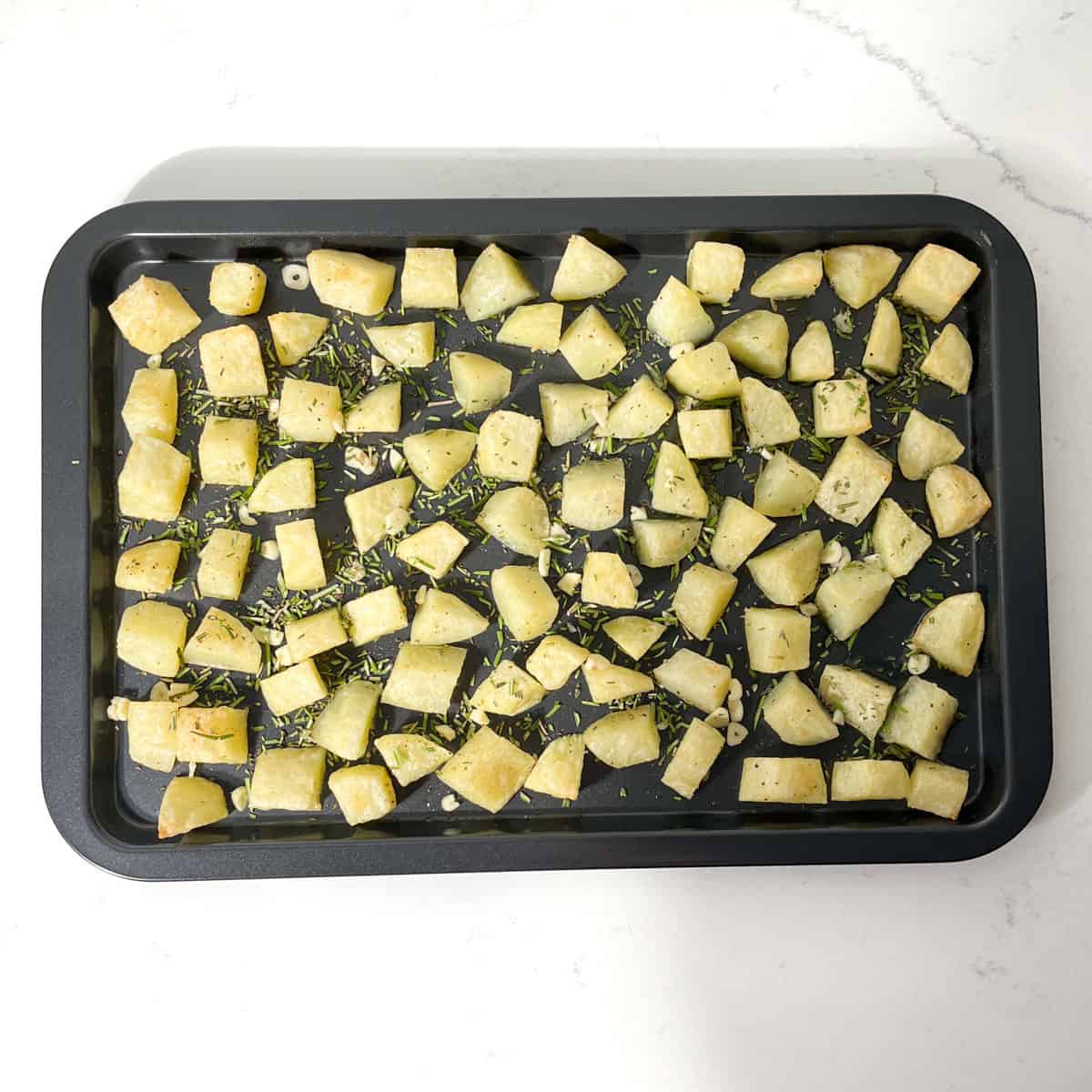
- After 25 minutes, remove the tray and mix in the chopped garlic and herbs. Ensure the potatoes are evenly re-distributed after mixing.
Mixing the potatoes thoroughly with the herbs and garlic will also allow you to re-coat the potatoes in some of the residual oil.
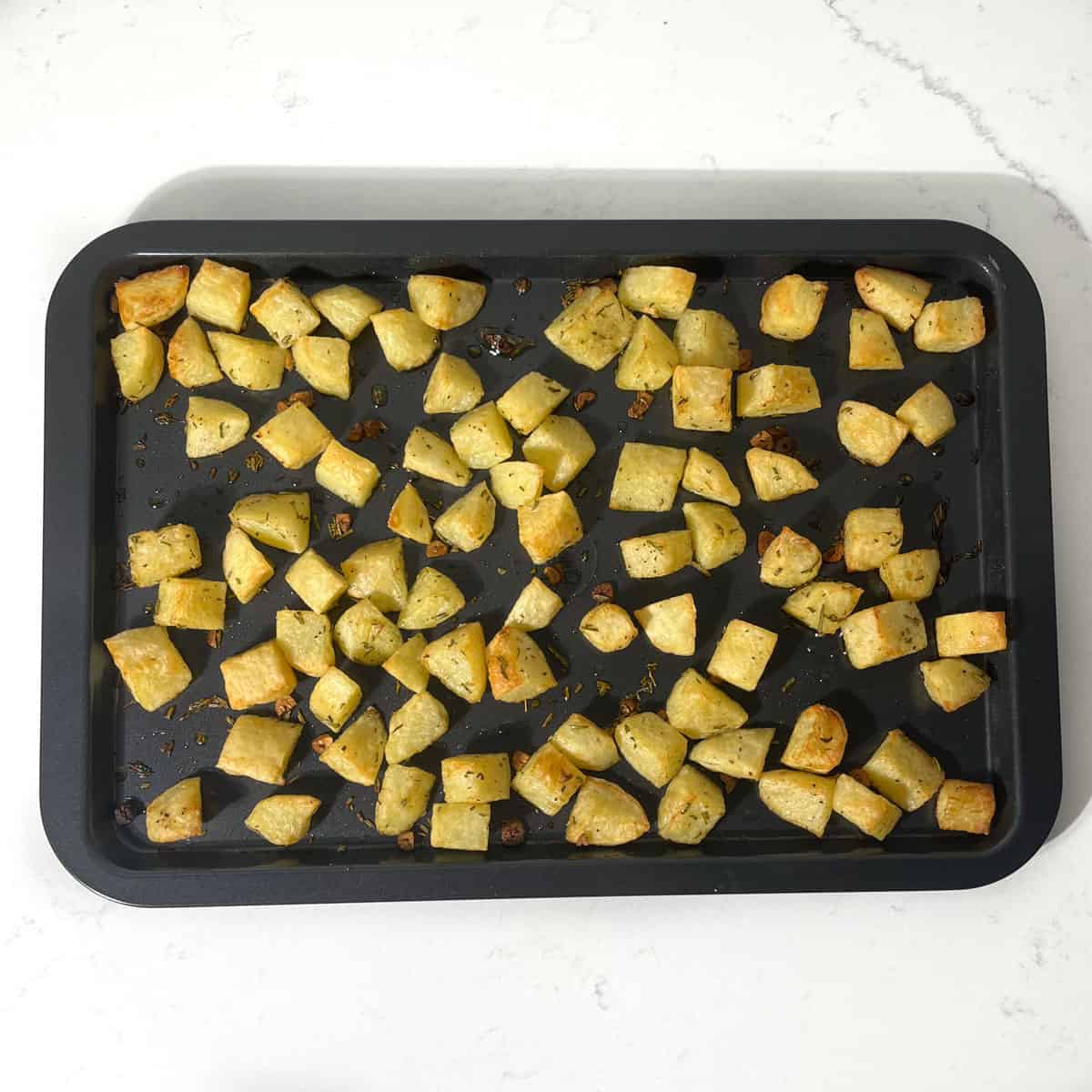
- Return to the oven and bake for 10-15 minutes more until the potatoes are crispy and golden brown to your liking.
- Transfer the potatoes to a serving bowl and enjoy immediately.
Top tips
Use the right potatoes
The key is to select starchy, all-purpose potatoes over waxy types like new potatoes or red potatoes. Baking potatoes like Maris Piper, Russets and Yukon Gold that are high in starch and low in moisture are ideal. Their dry, fluffy flesh gets that quintessential crispy exterior and soft interior when roasted.
Keep the cubes roughly uniform in size
Cut the potato cubes to approximately uniform size. They do not need to be perfect squares, but having them around the same dimensions ensures even cooking.
Potato pieces of varying sizes will roast at different rates, with smaller cubes overcooking before larger ones finish. Roughly uniform sizing results in a tray of potatoes that all reach the ideal crunchy exterior and fluffy centre together.
Don't rough up the potato cubes
Avoid roughing up the potato cubes. Unlike regular roast potatoes, these petite cubes do not need shaking in the pan to roughen the sides for crisping. Their small size already allows for ample crisping on the surface when roasted. Shaking would damage the cube shape and neat presentation.
Add the potatoes in a single layer
Arrange the oiled potato cubes on the baking tray in a single layer with ample space between each piece. For best results, ensure the cubes are not touching. Taking extra care to separate the potatoes allows for air circulation and direct heat exposure - both of which produce superior roasting and crisping.
If your tray is too small to hold the potatoes in a single layer, divide them between two trays. The time invested in properly spacing the potatoes really pays off in perfectly crispy Parmentier potatoes.
Add the garlic and herbs towards the end
Fresh garlic and herbs can burn very quickly with prolonged exposure to high heat. Don't be tempted to add them at the start of the cooking process because they will burn and make the potatoes bitter. Only add them for the last 10-15 minutes of roasting.
Variations
- Parmesan - Toss cubes in grated parmesan before roasting.
- Paprika - Dust with smoked, sweet or spicy paprika.
- Harissa - Coat potatoes in harissa paste or powder.
- Za'atar - Sprinkle this Middle Eastern spice mix over potatoes.
- Curry powder - Add a blend of curry spices to the cubes.
- Chilli powder - Dust with ancho, chipotle or cayenne powder.
- Turmeric - Add an earthy, vibrant flavour with ground turmeric.
- Cumin - Warm cumin complements roast potatoes nicely.
- Thyme - Use chopped fresh or dried thyme leaves.
- Basil - Use fresh basil for an Italian twist.
- Shallot - Add finely chopped shallot for a sweet, onion flavour.
- Chorizo - Toss finely chopped chorizo through the potatoes before baking.
- Red chilli flakes - For some extra heat
Serving suggestions
- As a side to roasted meats like chicken, beef, lamb or pork. Ideal with Sunday roasts and for a Christmas, Easter or Thanksgiving dinner.
- Alongside pot pies or stew for a mix of tender and crispy.
- Scattered over pizza before baking for a crispy topping.
- Tossed into a hearty salad with mixed greens, eggs and meats.
- Layered into a gratin with cheese and cream.
- Topped with sautéed peppers, onions and sausage.
- Mixed into a hash with eggs and other vegetables.
- Plated next to fish like salmon, cod or halibut.
- Served with dips like aioli, mustard or ketchup for dipping.
- On a breakfast plate with eggs, bacon and toast.
Storage
For the best taste and texture, Parmentier potatoes are at their best enjoyed fresh from the oven. However, any leftover Parmentier potatoes can be stored in an airtight container in the fridge for up to 3 days.
To reheat, spread the potatoes on a baking tray and bake at 200°C/392°F/gas mark 6 for 15-20 minutes until piping hot throughout. This oven method properly re-crisps and revives any leftovers.
Feel free to prepare them in advance and reheat them on the day for a quick side.
Can you freeze Parmentier potatoes?
Parmentier potatoes can be frozen, but they may undergo some textural changes that make them slightly less ideal. Here are some considerations:
- The crisp exterior will soften when frozen and thawed.
- The fluffy interior can become mealy or dry after freezing. The texture won't be quite as smooth.
- Any seasonings like herbs and spices can diminish in flavour intensity after freezing.
- Potatoes are prone to taking on "freezer taste" which can alter the flavour.
- Condensation after thawing can make the potatoes waterlogged.
Cook them from frozen at 200°C/392°F/gas mark 6 for 20-25 minutes until piping hot throughout.
Recipes to pair with Parmentier Potatoes
The secrets to the crispy roasted potatoes
Lilhapullat - Finish meatballs
FAQ
You don't have to, but it really helps getting those fluffy interiors, so it's worth the effort.
No, you can leave the skins on if that's your preference.
Canned potatoes are already parboiled, so you can skip that step and go straight to covering them in the oil and seasoning. Follow the instructions as per the recipe.
Absolutely, just double all the ingredients and follow the steps as per the recipe.
Recipe
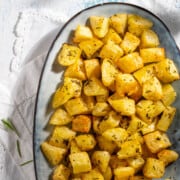
Parmentier Potatoes (Mini Roast Potatoes)
Ingredients
- 1 kilogram potatoes - like Maris Piper, Kind Edward, Rooster, Yukon Gold, Desiree
- 4 tablespoons vegetable oil - or any plain oil with a high smoking point like sunflower or canola
- 3-4 garlic cloves - chopped (about one heaped tablespoon)
- 3-4 sprigs rosemary - leaves stripped (about one heaped tablespoon chopped)
- salt and pepper to taste - as a guide, we add one teaspoon salt and half a teaspoon pepper
Instructions
- Preheat the oven to 220°C/428°F/gas mark 7. Have a large baking tray ready.
- Strip the leaves from the rosemary sprigs and finely chop the rosemary. Peel and chop the garlic.3-4 garlic cloves, 3-4 sprigs rosemary
- Peel and then slice the potatoes into cubes of roughly 2cm x 2xm. See blog post on how to slice cubes for Parmentier potatoes.1 kilogram potatoes
- Place the potatoes in a large saucepan and cover them with cold tap water.
- Place the saucepan on the stove over medium-high heat.
- Once the potatoes reach a rolling boil, immediately remove them from the heat. Do not boil them for longer. A rolling boil has large bubbles continuously rising rapidly to the surface. It is more vigorous than a gentle simmer.
- Drain the potatoes thoroughly in a colander. Then return them to the saucepan and leave to steam-dry for about 5 minutes (don't shake them as you might do for traditional roast potatoes).
- Once the potatoes are dry, transfer them to a large bowl.
- Add the olive oil, salt and black pepper to the potatoes.4 tablespoons vegetable oil, salt and pepper to taste
- Gently mix the oil and seasoning into the potatoes using a large spoon. Take care to coat each cube thoroughly on all sides. Use a gentle up-and-over motion to spoon oil from the bottom of the bowl back onto the potatoes.
- Tip the well-oiled potato cubes onto the baking tray in a single layer without touching. This allows for optimal roasting conditions.
- Bake them on the middle oven shelf for 25 minutes initially.
- After 25 minutes, remove the tray and mix in the chopped garlic and herbs. Ensure the potatoes are evenly re-distributed after mixing. Mixing the potatoes thoroughly with the herbs and garlic will also allow you to re-coat the potatoes in some of the residual oil.
- Return to the oven and bake for 10-15 minutes more until the potatoes are crispy and golden brown to your liking.
- Transfer the potatoes to a serving bowl and enjoy immediately.
Notes
Use the right potatoes
The key is to select starchy, all-purpose potatoes over waxy types like new potatoes or red potatoes. Baking potatoes like Maris Piper, Russets and Yukon Gold that are high in starch and low in moisture are ideal. Their dry, fluffy flesh gets that quintessential crispy exterior and soft interior when roasted.Keep the cubes roughly uniform in size
Cut the potato cubes to approximately uniform size. They do not need to be perfect squares, but having them around the same dimensions ensures even cooking. Potato pieces of varying sizes will roast at different rates, with smaller cubes overcooking before larger ones finish. Roughly uniform sizing results in a tray of potatoes that all reach the ideal crunchy exterior and fluffy centre together.Don't rough up the potato cubes
Avoid roughing up the potato cubes. Unlike regular roast potatoes, these petite cubes do not need shaking in the pan to roughen the sides for crisping. Their small size already allows for ample crisping on the surface when roasted. Shaking would damage the cube shape and neat presentation.Add the potatoes in a single layer
Arrange the oiled potato cubes on the baking tray in a single layer with ample space between each piece. For best results, ensure the cubes are not touching. Taking extra care to separate the potatoes allows for air circulation and direct heat exposure - both of which produce superior roasting and crisping. If your tray is too small to hold the potatoes in a single layer, divide them between two trays. The time invested in properly spacing the potatoes really pays off in perfectly crispy Parmentier potatoes.Add the garlic and herbs towards the end
Fresh garlic and herbs can burn very quickly with prolonged exposure to high heat. Don't be tempted to add them at the start of the cooking process because they will burn and make the potatoes bitter. Only add them for the last 10-15 minutes of roasting.**Nutritional data disclaimer**
Please keep in mind that the nutritional information provided below is calculated by a third party and we cannot guarantee the accuracy. We try our best to give you the most accurate information, but we do not take responsibility for errors that may be present. Also, the nutritional value of the recipe may change depending on the exact brands and products used. We recommend that you consult with a qualified healthcare professional or registered dietitian for personalised advice on your dietary needs.
Nutrition
For food safety advice, including guidance on food allergies


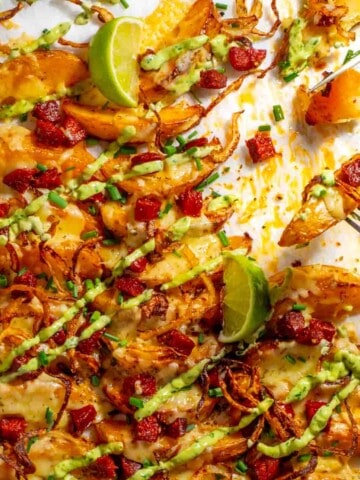
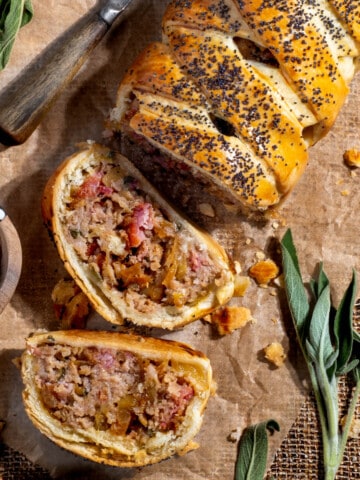
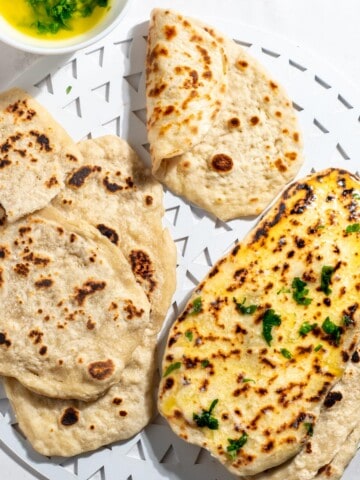
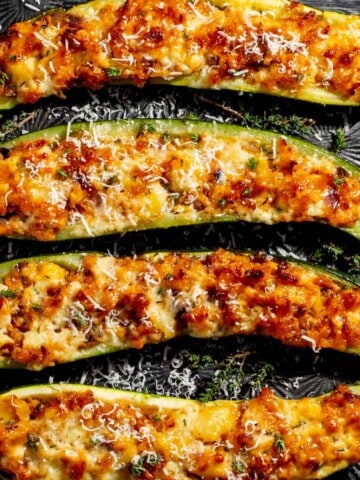
Leave a Reply